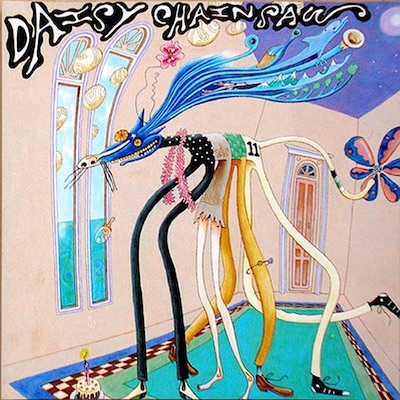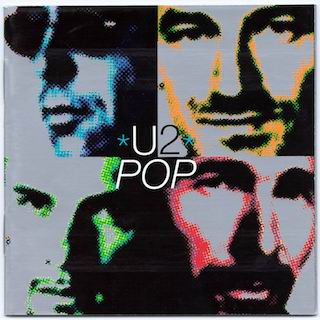
Alternative Rock
1992
Britain's no stranger to acerbic rock 'n roll, but the scene in the early '90s might have you believing otherwise. The indie charts were awash in the ecstasy-powered grooves of Screamadelica and The Stone Roses. Ride were headed in worryingly Beatles-y directions. Teenage Fanclub had just released their loud but utterly un-threatening power pop debut. It was thus left to Daisy Chainsaw to crawl out of the murky depths of London's underground garage shows and briefly smack society in the face with a vision of what punk should sound like.
The first 3 songs hit hard enough to leave the sturdiest noise rocker reeling. "I Feel Insane" is a furious onslaught of manic grunge-punk that introduces the band's incomparable frontwoman, Katie Jean Garside. Behind her Dickensian ragdoll ensemble lies a ferocious vocalist whose performances thrive on the catharsis of on-stage flagellation and cryptic songwriting. Her anti-rockstar mystique was unique enough that "Metal Mickey" (a 1993 song from future Britpop darlings Suede) would be written about her.
Guitarist Crispin Gray is another key part of the equation; with his glam-rocker looks and pulverizing guitar screech, it's like if the spirit of Mick Ronson was re-animated in Frankenstein's lab. "Dog With Sharper Teeth", kicks off with a brilliantly vile, scraping riff that works perfectly with KJG's urgent, yelped vocals. The bouncy cadence of "You Be My Friend" feels menacing, even as it sounds like it's hurtling towards you at 100mph, it's axles creaking, wheels moments away from falling off.
With a vocal style that inspired by Lydia Lunch (Teenage Jesus and the Jerks) and Kim Gordon (Sonic Youth), KJG's singing supports spectral chants and Courtney Love-caterwauling equally well. Her distorted screams in between the spoken-word parts and grinding riff of "Lovely Ugly Brutal World" are reminiscent of Kurt Cobain's when he'd do full-throated howls on parts of In Utero. Her best performance is on "Hope your Dreams Come True", the quiet-loud-quiet masterpiece of the album. She reaches an almost operatic register over a plinking piano melody that builds and builds a sense of foreboding before collapsing into a guitar assault, cuing the vocals to return to a brutal rasp. The unsettling riff that crawls across the start of the track is completely redone for the Peel Session, which sounds significantly punked-up and faster-faced and is a version well worth listening to.
The singles for this record did surprisingly well, with "Love Your Money" reaching No. 26 on the charts, propelled no doubt by its bouncy, growling bassline. Years later, when interviewed on MTV2, Muse guitarist Matt Bellamy would point to Love Your Money as the inspiration for the band's own ultra-distorted bass guitar. The silent horror-film style video for the latter makes it clear the band were going for a look and sound that didn't fit in with usual image of rock bands in leather jackets and shades.
Ever the showman, Crispin Gray enjoyed the commercial success of the single and the higher profile that came with it. But KJG struggled with the demands of touring and fame, which contributed to her splitting from the group after the release of the album.
The surreal artwork featuring the band members as stretched-out, amorphous stick figures is maintained across all their releases, including their 1991 EP Love Sick Pleasure and their second and final album, 1994's For They Know Not What They Do, recorded with new vocalist Belinda Leeth. The EP features "All the Kids Agree", an unmissable punk fireball that gets a thoroughly lacerating rendition on the band's appearance on John Peel's BBC Radio 1 show in 1992.
There hasn't been an English band this virulently noisy since, I don't know, Gang of Four? Godflesh? Sure, Ride and My Bloody Valentine were loud, but they didn't sound gritty and ever-so-slightly evil like this does. Heck, even Bauhaus left for less murky pastures after two or three albums. It's unfortunate that this kind of scrappy grunge largely died out after the Pixies and Nirvana split. The UK would of course offer up Bush to satiate ravenous American appetites for Nirvana pantomime, but that doesn't count (even they did hire Steve Albini to produce Razorblade Suitcase)!
Along with acts like Curve and PJ Harvey, Daisy Chainsaw added some much needed attitude to British rock at a time when the nation's upstarts (Manic Street Preachers) and elder statesmen alike (Jesus and Mary Chain) seemed to be turning down the volume to appeal to American rock audiences. The jagged edges, hyperactive vocals and piledriving guitars of Eleventeen belong in the same conversation as records by L7 and Hole, but sadly it was not to be.

